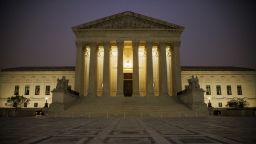The Supreme Court on Monday denied a request from tobacco company R.J. Reynolds to challenge a California law that bans the sale of flavored cigarettes.
There were no noted dissents.
The company, which makes menthol cigarettes, argued the state law conflicts with a federal law called the Tobacco Control Act that gives the federal Food and Drug Administration the authority to regulate the sale of cigarettes.
The ban is set to go into effect December 21, and the tobacco company said that without the Supreme Court’s intervention it would be barred from selling its menthol cigarettes – which make up approximately one-third of the cigarette market – in one of the nation’s largest markets.
In November, Californians went to the polls and approved the ballot initiative by a 63.5% to 36.5% margin. The law, SB 793, makes it illegal to “sell, offer for sale, or possess with the intent to sell or offer for sale, a flavored tobacco product or a tobacco product flavor enhancer.”
Lawyers for R.J. Reynolds argued that the lower court was wrong to “ignore” federal law and permit states to “completely prohibit” the sale of flavored tobacco products for failing to meet “tobacco product standards.”
They noted that in 2009, Congress “enacted a comprehensive regime” to distribute authority over tobacco product regulation between the FDA and state and local governments and that the law granted the FDA “primary authority” to regulate tobacco products.
In legal briefs, California urged the justices to stay out of the dispute, arguing that for more than a century, states have “carried out their authority” to “guard the health” of their citizens. California Attorney General Rob Bonta said the law at issue was necessary because “flavored tobacco products are the central cause of unfavorable trends in youth addiction to tobacco.”
He noted that the tobacco industry spent “tens of millions of dollars” trying to persuade voters to defeat California’s ban and failed to do so. He also said that when Congress passed the Tobacco Control Act in 2009, it “protected the pre-existing authority” of states with respect to the sale of tobacco products.
In a statement following the order, Bonta applauded the high court “for denying Big Tobacco’s latest attempt to block California’s commonsense ban on flavored tobacco products.” He added, “The voters of California approved this ban by an overwhelming margin in the November election and now it will finally take effect. I look forward to continuing to defend this important law against any further legal challenges.”





